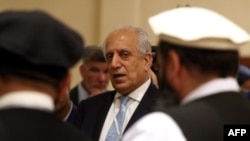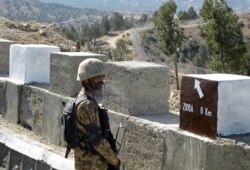Pakistan has reassured the United States of its "steadfast" support to the peace and reconciliation process in war-shattered Afghanistan, stressing the importance for all parties to the conflict to take "practical" steps to reduce hostilities.
Prime Minister Imran Khan's office said in a statement issued late Monday that he made the remarks in a meeting with visiting U.S. chief negotiator for Afghan reconciliation, Zalmay Khalilzad.
The U.S. envoy visited Islamabad a day after briefing leaders in Kabul on his renewed Afghan peace-building efforts. Khalilzad traveled to Afghanistan for the first time since President Donald Trump abruptly ended talks with Taliban insurgents last month.
"As a sincere facilitator and a friend, Pakistan remains ready to do everything possible in its capacity, as part of a shared responsibility, for (an) early conclusion of a peace deal," Khan said.
The yearlong U.S.-Taliban dialogue, hosted by Qatar, had brought the two adversaries close to concluding a peace agreement to end America's longest war before Trump abruptly ended the process. He cited a series of insurgent attacks in Kabul that killed, among others, a U.S. soldier.
Pakistan takes credit for arranging the U.S.-Taliban talks by persuading the insurgent group to come to the negotiating table.
"Achieving sustainable peace and security and ensuring long-term development, progress and prosperity in Afghanistan and the region was in Pakistan's best national interest," Monday's statement quoted Khan as saying.
Khalilzad's visit comes amid a new international diplomatic push by key regional players, including Russia, China and Pakistan, to help restart the stalled U.S.-Taliban talks and conclude the peace deal to end the Afghan war, which completed 18 years this month.
On Friday, Khalilzad visited Moscow for a four-party meeting with counterparts from Russia, China and Pakistan to review efforts the countries are jointly making to promote a negotiated settlement to the war.
A post-meeting statement said participants stressed the need for all parties to the Afghan conflict to immediately reduce violence to "create an environment conducive" for peace negotiations.
It noted Russia, China and Pakistan expressed their support for "the earliest resumption of (the) negotiation process and reaching an agreement" between the U.S. and the Taliban, saying it will pave the way for launching intra-Afghan talks.
In early October, Islamabad hosted informal talks between Khalilzad and Taliban negotiators. While the negotiating sides did not publicly discuss or even confirm the interaction, Pakistani officials said they had facilitated the meetings to help resurrect the U.S.-Taliban dialogue.
Afghan leaders allege Pakistan shelters Taliban leaders and fighters, enabling them to sustain and expand insurgent activities in Afghanistan.
Islamabad rejects the charges and does not rule out the possibility of insurgents using areas in Pakistan hosting nearly 3 million Afghan refugees as hiding place.
The two countries share a nearly 2,600-kilometer porous border, though Pakistan says its border management plan has secured most of the boundary over the past two years through fencing and establishing new outposts.






